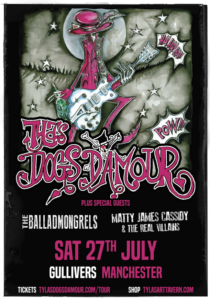
For a meat and potatoes opening to his bio, Louisiana native, Gill Landry, is a singersongwriter, multi-instrumentalist, adventuresome photographer, rubber tramp gentleman, self taught painter, shade tree mechanic, and then some. It would take a novel to tell his tale. From hustling the streets of Paris to hitchhiking America on day labor and daydreams, he’s slept beneath bridges with his brothers and in the beds of lordy estates. After cutting his musical teeth in New Orleans and chewing up half of America, he started writing songs about it; interpreting life from the curb up. He released his first solo album The Ballad of Lawless Soirez in 2007 on the Nettwerk label. Gill’s self titled third album is his first on the ATO label, but he is not new to the family. He’s played guitar, banjo, pedal steel, and been a contributing songwriter in Old Crow Medicine Show since 2004. Although Gill’s music is influenced by some of the same sources as Old Crow, from Dylan to old delta blues songsters, his music is very much his own. As Jeff Tamarkin put it, “Landry’s too sharp a storyteller, too tuned-in a craftsman, too real, to find himself on the wrong side of suspicion. Like Tom Waits, John Prine, Steve Earle… Landry is down-to-business believable. His songs carry their own persona, and though they may be creepy and otherworldly at times and nasty and grubby at others, they’re familiar while remaining at arm’s length.” After working through some more classic broken-hearted love songs on his first two albums, Landry says, “I tried not to come at this one from the point of how things could or should have been, or should be, but rather searched for sweet understanding and surrender to what is or was, and moving forward with compassion and kindness without harsh judgement to the reasons for this crime or that misstep.” Gill produced and recorded the album, “mostly from a ramshackle, shanty-ass apartment on the south side of Nashville,” but was aided by a constellation of talents gathered on his travels. From Laura Marling, who duets on “Take This Body”, an urgent plea that imagines the desperate love that courses through our impermanence, to trumpeter Nick Etwell of Mumford and Sons, who plays with tasteful power on a handful of songs. From Odessa, who lends harmonies and violin to a number of tunes, including the waltz-time love letter “Emily”, to Robert Ellis who’s eloquent and understated guitar work on “Fenario” and “Bad Love” is mellifluous. This album is one that anyone can relate to and will want to listen to, over and over, with their lovers. Even if those lovers are just in their minds.




